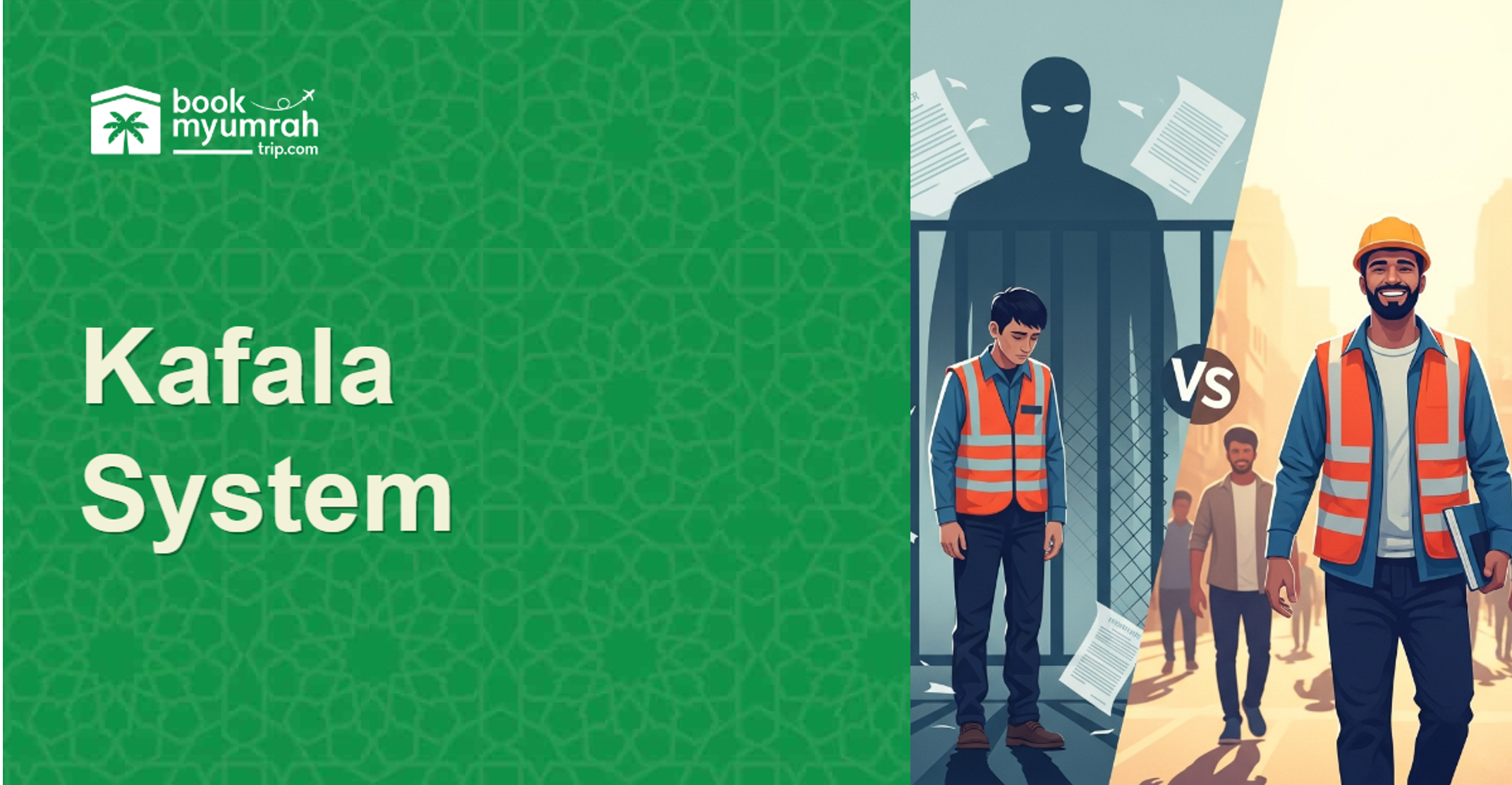Saudi Arabia Scrapped its 50 year old Kafala System

Team BookMyUmrahTrip
The 'Kafala system' was an agreement of sponsorship employment that bound migrant workers to their employers and was officially removed in Saudi Arabia in the month of October 2025.
What is the Kafala system?
The Kafala system is a sponsorship based system. For many decades this system has been in practice across Gulf countries like Saudi Arabia. The word “kafala” in Arabic means guardianship.
Under this system
The foreign workers do not have the authority to leave or change their jobs without their employer’s (kafeel) permission.
Their visa, employment, and even their ability to travel outside the country are all under the kafeel’s control.
The system gave employers immense power over workers’ lives, which made it more than just a typical job arrangement.
The Kafala system started in the 1950s, when the Gulf's oil boom meant that quickly growing economies needed foreign workers for big infrastructure projects. The system was meant to control migrant workers without making the government more complicated, but over time it created a big power imbalance.
Employers had the authority to take away workers' passports, limit their freedom of movement, and stop them from changing jobs. Human rights groups often compared these things to modern day slavery.
What does abolishing the Kafala system mean for Indians?
The historic decision of Saudi Arabia to abolish the "Kafala system" will impact over 2 million Indian workers. Indian workers in every industry are impacted by this shift, which includes IT, domestic work, healthcare, construction, etc. They can travel freely and have more control over their work lives.
Indian workers in every industry are impacted by this shift, which includes IT, domestic work, healthcare, construction, etc. They can travel freely and have more control over their work lives.
For Indian workers, the dissolution of the law means
Improved job opportunity: After completion of the contractual commitments, it is possible for you to change jobs without a "No Objection Certificate" (NOC) from prior sponsors.
Freedom to travel: To obtain exit or reentry visas, it no longer requires your employer's consent.
Increased negotiating power: You now have more negotiating power to obtain better wages and working conditions because employers are now forced to compete for talent.
Legal empowerment: It is the ability to file complaints in special labor courts. Without fear of immediate deportation, you can file a complaint against the employer's illegal act.
The Indian government welcomes the reforms and is working with Saudi authorities to educate its citizens about their new rights that potentially strengthen the bilateral ties between the two nations.
How the New System Changes the Iqama Process
The 'Iqama' is a Saudi residency permit. The Kafala system has now been done away with. It gave the employer complete control over the Iqama. This made workers dependent and limited their freedom. The new contract-based system has changed the situation in a big way.
This is such a welcome piece of news for the millions of Indian families with a loved one working in Saudi Arabia.
A New Dawn for Worker Rights to break up the text further
For years, if you were a nurse, a construction worker, a domestic helper, or an IT professional, your life and career were tightly bound to your employer's permission.
That's finally changing. That old knot of fear in your stomach on a Sunday night? The one that came from feeling trapped in a job with no way out? It's finally starting to loosen.
For so long, your future depended on a "No Objection Certificate," which is a permission slip from the boss you were leaving. It used to be a humiliating experience.
As of now, once your contract is over, you can move forward, and any decision of your life is under your control.
Even going home for a visit no longer feels like a negotiation.
A trip home doesn't have to be a negotiation: The simple, human need to visit family during a crisis or for a celebration no longer requires the employer's green light for exit and re-entry visas.
Your skills are finally yours to sell: This means a person can realistically ask for better pay and fairer working conditions. Your experience has real value, and now you can claim it.
You have a voice: Previously, reporting a problem or going to a labor court carried the terrifying risk of immediate deportation. Now, workers can stand up for their rights without that same fear. It transforms them from being powerless to having legal standing.
It's heartening to see the Indian government is working with Saudi authorities to spread the word about these new rights. The goal is to make sure every worker knows the power they now hold.
Saudi Arabia's Kafala system abolition brings significant changes.
Job Mobility: After completion of contract or with 90 days' notice, workers can switch employers.
Travel Freedom: Exit visas are not required for any workers; they can travel.
Access to Justice: Easy access to labor courts and complaint mechanisms.
Digital Platforms
Qiwa and Absher enable online sponsorship transfers and other services.
If the employer doesn't respond within 10 days, it approves your transfers.
Impact
Improved worker rights and freedoms.
More competitive job market.
Reduced exploitation.
Takeaway
The elimination of the ‘Kafala system’ brought a major turning point for Saudi Arabia and its migrant workers, especially for Indians. They were granted autonomy, dignity, and hope. The transition to a contract based system gives employees the freedom to pursue justice, manage their careers, and reconnect with their families.
FAQs
1. Under the new system, what are the online platforms to manage my job?
To make the new procedures easier, the Saudi government has implemented digital platforms that are easy to use. You can ask to have your sponsorship transferred to a new employer via the Qiwa platform. The system automatically approves the transfer request if your current employer doesn't reply to it within a predetermined time, such as ten days.
2. How is the Indian government assisting employees in comprehending these new rights?
The Indian is collaborating with the Saudi officials to promote the new labor reforms. They both are using embassies, consulates, and community networks to ensure that Indian workers are aware of their labor rights.


